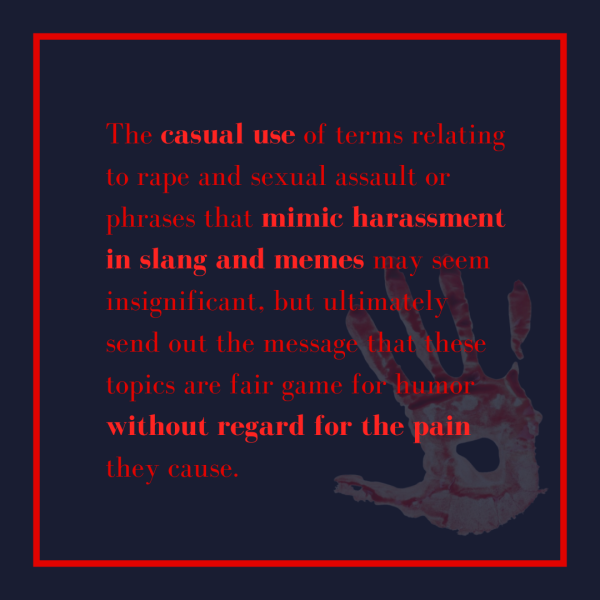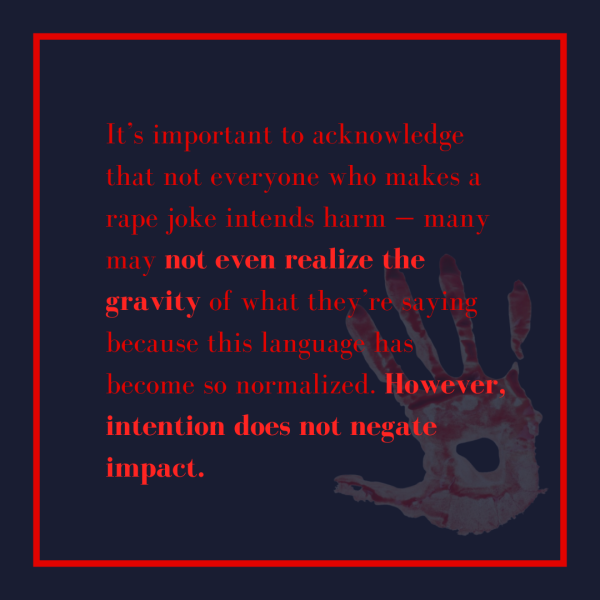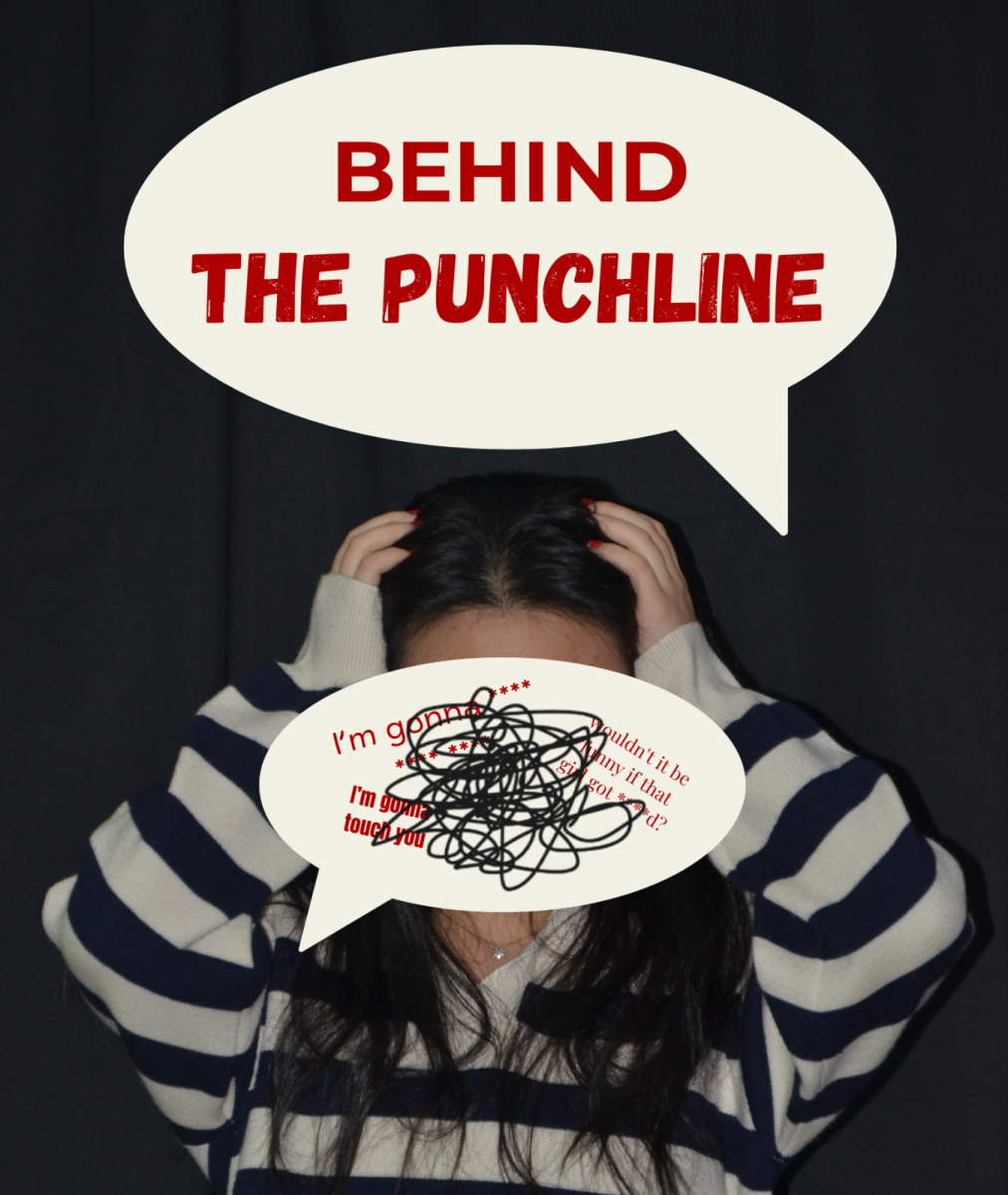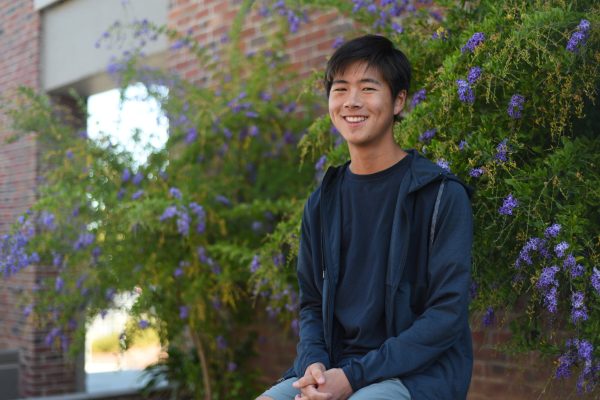Trigger warning: This story mentions sexual assault.
“I’m gonna touch you” is a phrase that has grown far too common in MVHS’s soundscape. While it’s often used in a seemingly lighthearted way, typically as a retort, its implications and derivatives cannot be ignored, as they downplay the severity of sexual misconduct and assault. Jokes or statements such as these minimize the gravity of sexual harassment, perpetuate toxic cultures and normalize behaviors that can lead to real harm. It’s time to rethink what we’re laughing at.
Rape jokes were prevalent in the media for years before the #MeToo movement, which brought awareness to sexual violence, gained traction in 2017 and criticized rape culture. Movies labeled comedies, namely 2007’s “Superbad,” which follows teens who attempt to drug their female classmates during a party, presented sexual assault and harassment as a form of adulthood, while stand-up comedians, including Daniel Tosh and Jimmy Carr, joked about rape to audiences. In one instance, Tosh remarked to a female audience member who criticized his crude humor, “Wouldn’t it be funny if that girl got raped by, like, five guys right now? Like right now?”

In making this infamous comment during his stand-up show, Tosh wasn’t just making an off-color joke — he was reinforcing the idea that it’s acceptable to laugh at someone else’s trauma and even encouraging others to do so as well. The fact that it happened in a public space to a paying audience makes clear how deeply-rooted this issue is. Public figures like Tosh and Carr who engage in this type of humor validate it, encouraging others to adopt a similar mindset, especially when they face little to no backlash.
Even after the #MeToo movement put such jokes under scrutiny, social media has continued to make light of rape through the use of memes, namely those made about allegations regarding Sean “Diddy” Combs’ sexual misconduct. In this way, social media plays a huge role in perpetuating this harmful rhetoric, with platforms like TikTok and Instagram promoting lighthearted language that trivializes sexual assault. The casual use of terms relating to rape and sexual assault or phrases that mimic harassment in slang and memes may seem insignificant, but ultimately send out the message that these topics are fair game for humor without regard for the pain they cause.
These attitudes have begun to filter into MVHS’s culture, and in school settings, peer influence exponentially increases the scale of this issue. Among friend groups, rape jokes can be passed off as harmless or even witty. However, what begins as a joke among friends goes unchecked and leads to the blurring of strict boundaries that should not be broken.
Moreover, students’ normalization and popularization of this rhetoric inspires other students to act the same way. When students hear these jokes from their friends, they’re less likely to question and more likely to repeat, creating a positive feedback loop of problematic rhetoric and encouraging an overall toxic school environment when it comes to this issue.

It’s important to acknowledge that not everyone who makes a rape joke intends harm — many may not even realize the gravity of what they’re saying because this language has become so normalized. However, intention does not negate impact. Joking about rape blurs the line between what is acceptable humor and what crosses into harassment, minimizing the trauma of sexual assault survivors and allowing harmful behaviors to escalate. Ultimately, language shapes behavior, and what starts as a casual joke can just as easily influence real-world actions.
To address this issue, it’s also essential to draw a clear distinction between what’s considered an acceptable topic to humorize and what crosses into the territory of harassment to curb the harmful progression and desensitization of these jokes. Schools can contribute to this effort by implementing educational programs that focus on the impact of such language, perhaps through advisory periods with cautiously chosen language to ensure that, in addressing these issues, these programs aren’t further perpetuating these jokes. These programs can encourage students to think critically about their jokes and call out inappropriate behavior when they see or hear it.
Ultimately, a cultural shift is needed — one that rejects jokes about sexual assault and recognizes the gravity of these issues. One that begins with rethinking the language we use and the jokes we choose to make.












